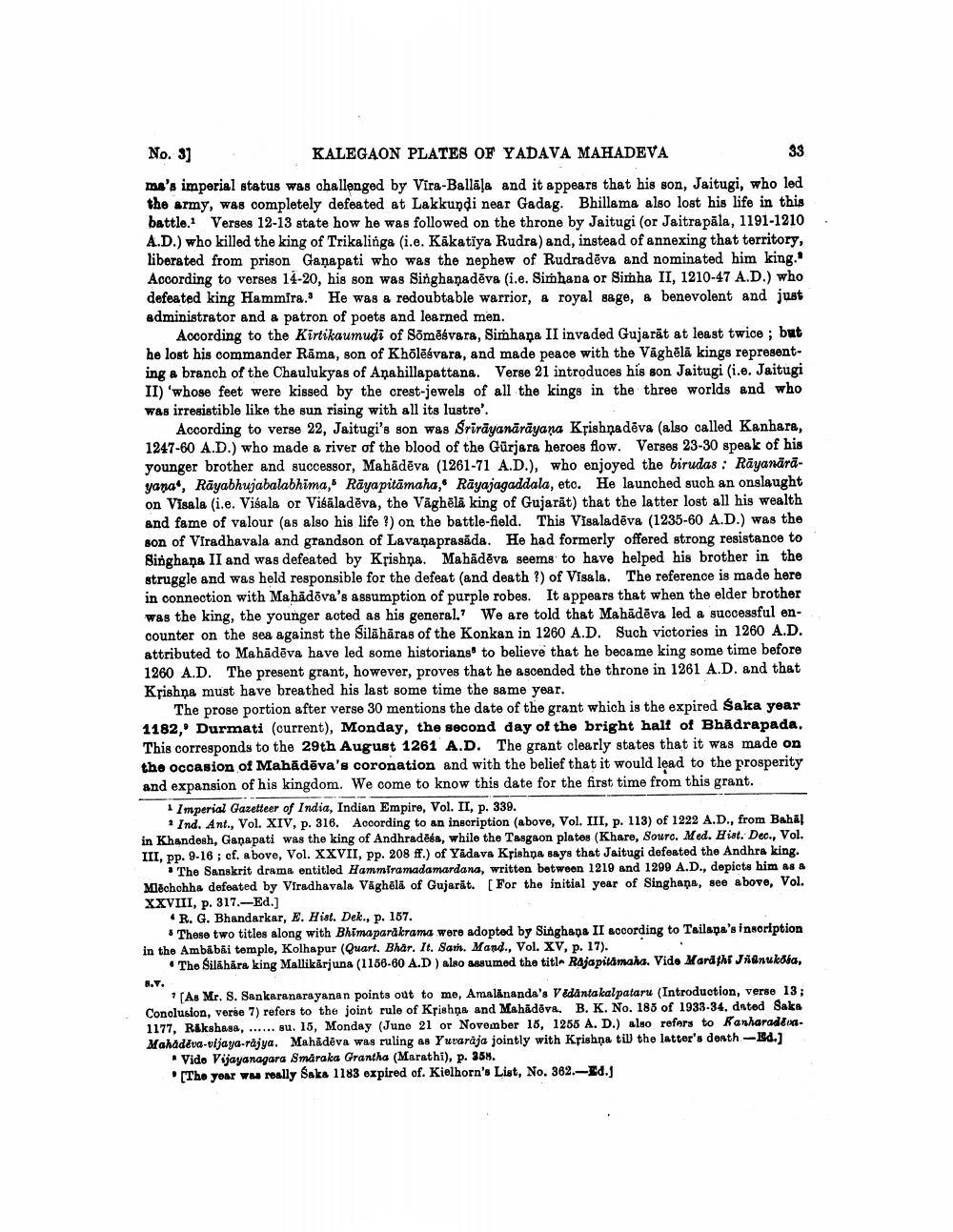________________
No. 3)
KALEGAON PLATES OF YADAVA MAHADEVA ma's imperial status was challenged by Vira-Ballala and it appears that his son, Jaitugi, who led the army, was completely defeated at Lakkundi near Gadag Bhillama also lost his life in this battle. Verges 12-13 state how he was followed on the throne by Jaitugi (or Jaitra pāla, 1191-1210 A.D.) who killed the king of Trikalinga (i.e. Kakatiya Rudra) and, instead of annexing that territory, liberated from prison Ganapati who was the nephew of Rudradēva and nominated him king.' According to verses 14-20, his son was Singhanadēva (i.e. Simhana or Simha II, 1210-47 A.D.) who defeated king Hammira. He was & redoubtable warrior, & royal s&ge, a benevolent and just administrator and a patron of poets and learned men.
According to the Kirtikaumudi of Sõmēsvara, Simhana II invaded Gujarat at least twice ; but he lost his commander Räma, son of Khõlēsvara, and made peace with the Väghēlā kings representing a branch of the Chaulukyas of Anahillapattana. Verse 21 introduces his son Jaitugi (i.e. Jaitugi II) 'whose feet were kissed by the crest-jewels of all the kings in the three worlds and who was irresistible like the sun rising with all its lustre'.
According to verse 22, Jaitugi's son was Srirāyanārāyana Krishna dēva (also called Kanhara, 1247-60 A.D.) who made a river of the blood of the Gurjara heroes flow. Verses 23-30 speak of his younger brother and successor, Mahādēva (1261-71 A.D.), who enjoyed the birudas : Rāyanārāyana', Rāyabhujabalabhima, Rāyapitāmaha, Rāyajagaddala, etc. He launched such an onslaught on Visala (i.e. Višala or Visāladēva, the Väghēlā king of Gujarat) that the latter lost all his wealth and fame of valour (as also his life ?) on the battle-field. This Visaladēva (1235-60 A.D.) was the son of Viradhavala and grandson of Lavanaprasāda. He had formerly offered strong resistance to Singhaņa II and was defeated by Krishna. Mahādēva seems to have helped his brother in the struggle and was held responsible for the defeat and death ?) of Visala. The reference is made here in connection with Mahadeva's assumption of purple robes. It appears that when the elder brother was the king, the younger acted as his general.' We are told that Mahädēva led a successful encounter on the sea against the Silähāras of the Konkan in 1260 A.D. Such victories in 1260 A.D. attributed to Mahādēva have led some historians' to believe that he became king some time before 1260 A.D. The present grant, however, proves that he ascended the throne in 1261 A.D. and that Krishna must have breathed his last some time the same year.
The prose portion after verse 30 mentions the date of the grant which is the expired Saka year 1182, Durmati (current), Monday, the second day of the bright halt of Bhadrapada. This corresponds to the 29th August 1261 A.D. The grant clearly states that it was made on the occasion of Mahādēva's coronation and with the belief that it would lead to the prosperity and expansion of his kingdom. We come to know this date for the first time from this grant.
* Imperial Gazetteer of India, Indian Empire, Vol. II, p. 339.
* Ind. Ant., Vol. XIV, p. 316. According to an inscription (above, Vol. III, p. 113) of 1222 A.D., from Bahal in Khandesh, Ganapati was the king of Andhradēta, while the Tangaon plates (Khare, Sourc. Med. Hist. Dec., Vol. III, pp. 9-16 ; cf. above, Vol. XXVII, pp. 208 ff.) of Yadava Krishna says that Jaitugi defeated the Andhra king.
• The Sanskrit drama entitled Hammiramadamardana, written botwoon 1219 and 1299 A.D., depicts him as a Mléchchha defeated by Viradhavala Väghola of Gujarat. [For the initial year of Singhaņa, see abovo, Vol. XXVIII, p. 317.-Ed.]
.R. G. Bhandarkar, E. Hist. Dek., p. 157.
These two titles along with Bhimaparakrama were adopted by Singhapa II according to Tailapa's insoription in the Ambabãi temple, Kolhapur (Quart. Bhar. It. San. Mand., Vol. XV, p. 17).
The Sil håra king Mallikarjuna (1156-60 A.D) also assumed the title Rajapitámaha. Vido Mardfhs Jaenuksia, 8.V.
As Mr. S. Sankaranarayanan points out to me, Amalānanda's Vedantakalpataru (Introduction, verse 13; Conclusion, verse 7) refers to the joint rule of Krishna and Mahadeva, B. K. No. 185 of 1933-34, dated Saks 1177, Rakshasa, ...... su. 18, Monday (Juno 21 or November 18, 1268 A. D.) also refers to Kanharadan Mahadeva-vljaya-rajya. Mahadeva was ruling as Yuvaraja jointly with Krishna till the latter's death-19d.]
. Vido Vijayanagara Smaraka Grantha (Marathi), p. 358. [The your was really Saka 1183 expired of. Kielhorn's List, No. 362.-Ed.




